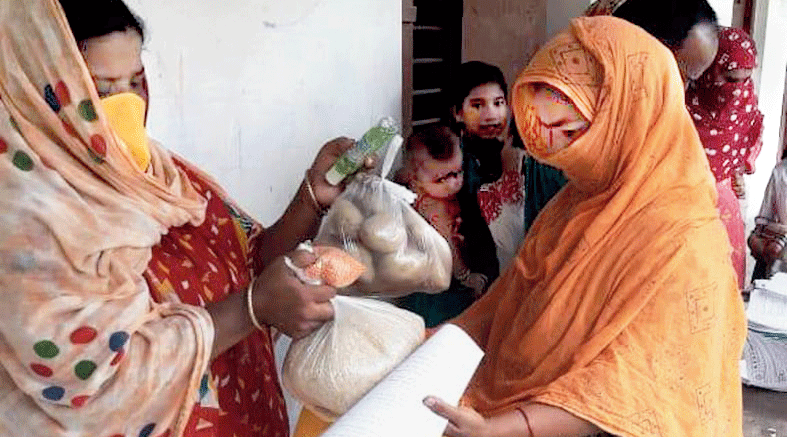Every fortnight, scores of madrasas in Bengal have been coming alive amid the lockdown. But those attending the “classes” are not the students but their parents.
They are being taught how and what to teach their children at home at a time when the Covid-19 pandemic has shut classrooms across the country.
The initiative is part of a “cost-effective and inclusive” model of teaching and evaluating students that the West Bengal Board of Madrasah Education has worked out while many Indian schools are grappling with the digital divide that is vitiating their online classes.
Not that the parents have been asked to turn up for this specific purpose. An opportunity was spotted and put to use because parents in any case have to reach the madrasas to collect dry rations meant for the midday meal scheme that students cannot access directly because of the Covid closure of educational establishments.
The model is “cost-effective”, board chairperson Sheikh Abu Taher Kamruddin says, because it doesn’t require the pupils to buy laptops or smartphones or acquire Internet connections that are poor in rural areas.
“It’s inclusive because it includes people who are on the other side of the digital divide,” Kamruddin said.
It’s inclusive also because it seeks to give the parents — mostly school dropouts caught in the daily grind of earning a livelihood — a hands-on role in facilitating their children’s learning.
Nearly six lakh students, including many non-Muslims, study in Bengal’s madrasas from Class V to X. These schools largely follow the same curriculum as other state-aided schools.
Ayub Ali, assistant teacher at the Gangadhari H.B. High Madrasah in Nowda, Murshidabad district, explained the system. (Madrasa is spelt in English in different ways.)
“The parents of students who are in Class VIII or below have been turning up at the madrasas on a particular day every fortnight during the lockdown to collect food grains for the children under the midday meal scheme. Over the past month, our teachers have been sitting with the parents and showing them the lessons they should impart to their children over the next fortnight in the various subjects,” Ali said. “It’s also briefly explained to them how to aid the students’ learning.”
Ali said the parents of Class IX and X students are being called to the school separately because they need more elaborate explanations on how to help their children learn at home.
Parents who are not confident about teaching their children are being urged to bring along relatives or friends.
The “experiment” is already under way in most of the state-aided madrasas in Murshidabad and Malda, home to 115 and 84, respectively, of the 614 such schools under the state madrasa education department, headed by chief minister Mamata Banerjee.
“We are planning to roll out this model in the other districts too,” board chief Kamruddin said.
With the initiative quickly drawing an “overwhelming” response from the parents, the board decided to take the next step of conducting some form of evaluation of the students’ progress. It, therefore, enlisted the parents’ help also in getting their children to sit their exams at home.
“When we began the experiment, the most important thing for us was to ensure the students retained the habit of spending time with their books,” said Aminul Islam, headmaster of the D.S.K.B. High Madrasah at Kaliachak-II block in Malda district. “Then we realised that the parents were taking a keen interest in their children’s studies, and thought of evaluating the pupils too with their help.”
First, Aminul said, the teachers were asked to prepare question papers. These were then sent to the heads of the madrasas through WhatsApp groups. The heads downloaded the question papers and got them printed and photocopied.
“When the guardians came to collect the food grains for their wards, we handed over the question papers to them. They were told to act as invigilators while their children took the exams at home, and then hand the answer scripts over to us,” a headmaster said.
The exams — terminal tests before the annual exams, usually held in December — started over the past week. In several madrasas, the exams are almost over and the answer scripts are being evaluated.
Some parents have coped with their new challenge better than others.
“I studied till Class XII. When the teachers told me I would have to teach my son, who is in Class VI, I was initially taken aback. But they guided me whenever I went to the school to collect food grains for my son,” said Liton Sheikh, small-time trader from Sadipur in Kaliachak-II block, Malda. “My son too is happy to see me as a teacher, having hardly ever sat with me to study before.”
But mason Rakibul Mollah, a Class IV dropout, said there was no way he could teach daughter Tania Khatun, a Class IX student at the Gangadhari H.B. High Madrasah in Nowda, Murshidabad.
“When Sir (a teacher) told me about it at the school, I said I couldn’t. So he simply marked the chapters my daughter was to read over the following fortnight,” he said. “I have asked her to study sincerely. I make her take the exams at evening, when I can sit with her and ensure she doesn’t consult books.”
Confidence and trust play key roles in the new model, Kamruddin said. Confidence in most parents’ ability to grasp the essence of a fortnight’s worth of lessons and impart it to their children, and trust in their commitment to have the children take the exams honestly at home.
Anarul Haque, headmaster of the Bhabta Azizia High Madrasah in Murshidabad, saluted the parents.
“It’s a pleasant surprise how the exercise has created an interest among the guardians, particularly among those who have been able to teach their children,” he said. “They are curious to know the performance of their wards. We believe they want to know how their teaching has helped.”










